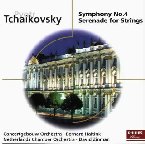Bernard Haitink’s 1978 reading of Tchaikovsky’s F minor Fourth Symphony is expertly played by the Concertgebouw and faithfully and atmospherically recorded by the Philips engineers. Haitink paces the music intelligently, and the lack of emotional overkill doesn’t signify any lack of excitement. One benefit here is the amazingly clear first-movement development; the dense string exchanges (outstandingly firm cello and bass lines) aren’t swamped by brass salvos. Moving on, solo oboe and cellos in the slow movement are superb, and the bright, full acoustic of the Concertgebouw lets the strings play a real pianissimo at the almost imperceptible opening of the pizzicato scherzo. In the trio section Haitink’s drunken peasant doesn’t reel and rollick as much as some others, but the little march-past by the military band flashes and glimmers to good effect, and the throwaway ending is perfectly managed.
Haitink’s finale isn’t as fast as say Mravinsky’s with the Leningrad Philharmonic on DG, or Maazel’s with the Clevelanders on Telarc, but (to paraphrase Mahler) it’s quick enough to allow every note to be clearly heard. There’s firmness and weight to the scurrying string passagework, and the brass are spectacularly incisive–but without the raw, nerve-tingling edginess of a Russian band such as Mravinsky’s. The central crisis (surmounted by a return of the motto theme) is watchfully controlled, and in the coda, Eloquence’s pristine transfer allows you to hear the almost imperceptible start of the long timpani roll, usually a feature of the best-engineered recordings of the work.
For a comparably vivid recording, and common-sense musical values to match Haitink’s, you could try David Zinman’s Baltimore Symphony account on Telarc. Zinman, incidentally, directs the Netherlands Chamber Orchestra for Eloquence’s filler, Tchaikovsky’s String Serenade. It’s a polished and effective reading, nicely recorded but lacking the kind of idiomatic warmth and allure (especially in the waltz and élegie) that Neville Marriner and the Academy of St. Martin in the Fields provide, on Decca. But Haitink’s masterfully controlled Fourth will continue to appeal long after more theatrical interpretations have lost their attraction. But remember, Eloquence provides no liner notes on the music.
































